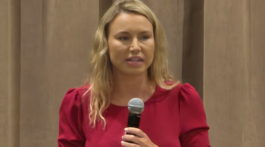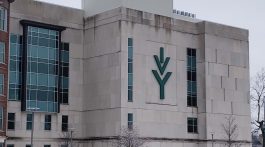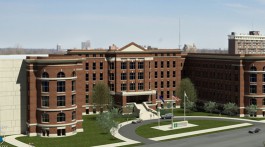By Dr. Andy Bowne
I moved to Yorktown, Indiana from Grand Rapids, Michigan in 2012. I saw the opportunity to lead the East Central region, and now also Richmond region, of Ivy Tech Community College, and wanted to help change lives. Since that time, I’ve been overwhelmed with the success of our students, passion from the faculty, and support from the community.
The College has been put under a microscope recently, a lot here in Muncie, because of a term commonly used in education – “on-time graduation rates.” This causes me a lot of concern because “on-time” doesn’t always mean the best option for students. Not just Ivy Tech students, but all students.
Being a student is no small feat. Neither is working (full-time or part-time), raising a family, being a single parent, etc., etc. We know an overwhelming percentage of our students fall into more than one of these categories, for example: student and working full-time, or student and raising a family.
To graduate “on-time” students would need to take 30 credit hours in an academic year. That could mean 15 credit hours in the Fall and Spring terms, or taking less in these semesters, but adding in some additional classes in the summer.
In the Spring 2015 semester, the East Central region (Muncie, Anderson, Marion and New Castle) had nearly 89% of our degree seeking students taking less than 15 credit hours. For these students, achieving a two year on-time graduation is likely not their intent. They are working toward their credential on a timeframe and course load that is doable for them to succeed. Does that make them a loser or a failure? NO. Slow and steady wins the race too.
The National Community College Benchmark Project (NCCBP, www.nccbp.org), takes into consideration completion, both in three years and six years, and also those students that transfer. Ivy Tech Community College has an academic division devoted to those students that intend to transfer. While our hope is that they earn their credential before transferring, the reality is, some do not do that and transfer credits as they go. Does that make them a loser or failure? NO. But, they are not counted in Ivy Tech completion numbers.
NCCBP data indicates for students attending school part-time in the East Central Region, nearly 45% complete their credential or transfer in six years. When this data is compared against other community colleges in the country, Ivy Tech Community College statewide is in the top 30 percent.
The Commission for Higher Education (CHE) College Completion Report indicates more than 20% of all full-time students earn a degree within three years (not including transfer students). The trend of wanting and needing longer than two years to complete a degree is not only prevalent at the East Central Region of Ivy Tech, but on a larger scale as well.
Davis Jenkins, noted community college researcher, and Serena Klempkin, wrote an article through the Community College Research Center (CCRC) and suggest on-time graduation rates are “not a panacea.” They also mention, “Enrolling in more courses will benefit no one if the result is higher failure rates, or an accumulation of credits that don’t lead to the completion of students’ desired programs.”
Overall, our goal is to increase graduation rates, regardless of the timeframe, and we know that academic advisors and full-time faculty plan an important role with our students. Statewide and regionally, we are investing in both areas. We support our students and their success is our top priority.
When you look at data and compare us to other four year universities or even those students that enroll full-time, it just doesn’t tell the whole story. I conferred more than 1,300 credentials at commencement this May in the East Central region, and many more were conferred across the state. Most may not have done it in two years, but they did graduate. They achieved their goal and will have a credential for the rest of their lives.
All students are winners.
Dr. Bowne is the Chancellor for Ivy Tech Community College East Central and Richmond regions













